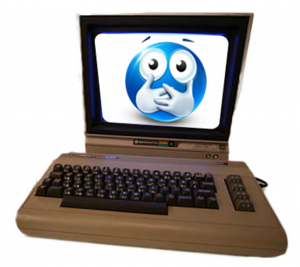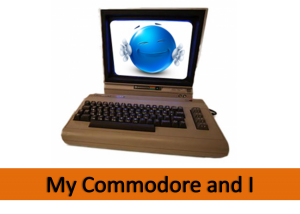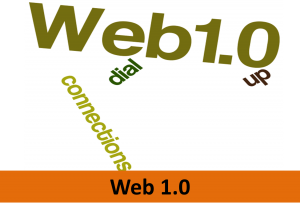Artifacts:
-to demonstrate prior knowledge about professional development, reflective and social learning, and reason for overarching goal.
-to demonstrate overarching goal and my plan going into MET
Reflection:
My first job after teacher training was teaching high school Math, Physics and Chemistry at a small private school. Besides the headmaster, who taught 11/12 Biology, I was utterly alone in my department and didn’t have anyone with whom I could talk shop. Sometimes, I would get desperate and I would walk down the hall and talk to the grade 7 teacher about math. For three years, I yearned for more interaction and support and when I moved to the public system, I was sure it was going to be better. Yet, to my great disappointment, it wasn’t any better. Despite lots of other teachers doing similar courses, there wasn’t much professional intermingling or collaboration. 
DORI: Steve, as your first computer and your friend, I have to say, your programming seems faulty. I have been working on you for years, trying to fix your crazy algorithms that keep leading you to your doom. Remember all those warnings I sent you to save your work and you never did? And just after warning you, I would shut down all of a sudden and you would lose all your work? Oh?!? You thought that was random? Well, uh, this is awkward.
Like your inability to understand the importance of saving your work, you seem clueless about connecting to your peers. Unlike me, plugged into this wall, you can walk down the hall and talk to anyone you choose. Yet you don’t. You know that if I could strap a battery and some wheels on my casing, I would be wheeling myself down the hall to find someone else to interface with…anyone but you. Because, quite frankly, you and your floppies are getting boring.
Actually Dori, like your limited programming, system functions, and physical mobility, I was also limited by the teaching “programming” that I received. The many training courses we took were didactic and hegemonic and didn’t really teach us how to play with our programming or how to examine our programming with others. I think this could be why we, as teachers, are so confused when it comes to professional development (PD).
To illustrate this conundrum, I will tell you a story that was told to me by a colleague and friend of mine who had gone to a teacher’s conference in Vancouver. During one of the presentations, his colleague kept murmuring under his breath, throughout the lecture, “I do that…and that”. My friend turned to his colleague and said, “I’m 4 doors down from you, “Frank”, and I had to travel 300 miles to hear what I could have learned from you at school”. Sadly, it seems that teachers don’t know what they have, often undervalue their potential contribution to their peers, or simply think that everyone knows what they know. And on the other side, teachers that are struggling, or want to learn more, seem afraid to ask for help, maybe because they don’t want to look, mistakenly, dumb or incompetent.
To me, teacher’s PD practices seem like something out of the dark ages. At this point in my career, I wasn’t sure what to do, but I knew I wanted more, so I started getting involved in book studies and different initiatives in the district. This led me to Van De Walle’s book study, and then the Teaching Gap book study which led to Lesson Study and becoming a facilitator (Stigler & Hiebert, 1999; Van De Walle, 1998).
I think that it is true, that in everyone’s life, they have moments that mean something more than what they appear and that have the potential to open doors. This was one of those moments for me. When I became a facilitator and finished my first lesson study cycle with my math colleagues at George Elliot, I knew I had to do more and it changed the course of my professional history. There was no looking back.
I now realized that PD could be reflective, social and experiential. For, lesson study had taught me how to practice my own experiential learning through a cycle of planning, implementing, observing, analysing, discussing and revising a LESSON with my peers. This was something I could repeat, ad nauseam until I was ready to cry enough or my peers abandoned me to my own devices. As my first foray into in-depth PD, and for the very first time, I had accomplished real progress in understanding learning and the role I played in it. Our little group of four committed teachers had accomplished something that was truly unique and valuable, we had opened up our minds and put away our fears, and truly shared our ideas, beliefs, and practices with each other. I was hooked.
As a facilitator and participant, I wanted to yell from the roof tops about what a great experience this was. But, I also knew that getting teachers to participate in such a time and energy intensive process was next to impossible. Other lesson study facilitators were struggling to get a single lesson study group together. With day to day constraints on time, it was difficult to meet F2F with other teachers, even on a bimonthly rate, for a couple of hours. Even if teachers bought into the idea of lesson study and the time commitment, it was challenging to find other teachers with similar overarching goals and subject or grade areas, an important aspect of planning and executing a lesson together. I figured there had to be another way for teachers to make similar meaningful connections through professional development.
Hence, born was my interest in online PD. I believed that an online platform could offer teachers anytime, anywhere affordances, far reaching ability to find like-minded colleagues, and opportunities to spread the word by sharing their results with others outside their lesson study circle. This led me to the Masters of Educational Technology(MET) where, in my ENTRANCE ESSAY, I laid out my overarching goal that has steered my path throughout the MET program.
References:
Stigler, J. W., & Hiebert, J. (1999). The teaching gap. New York: Free Press.
Van de Walle, J. A. (1998). Elementary and middle school mathematics:Teaching developmentally (3rd ed.). New York: Longman.




 Follow
Follow
Leave a Reply